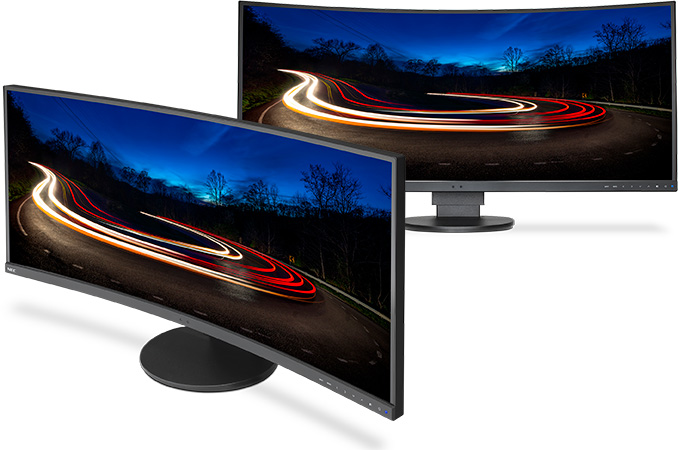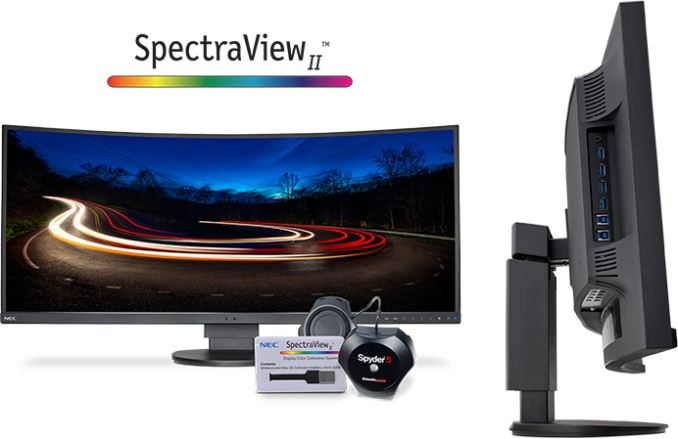NEC Goes for a Curved Display, Launches 3440×1440 MultiSync EX341R Monitors
by Anton Shilov on February 9, 2017 6:00 PM EST
This week NEC has announced its first curved ultrawide display, the EX341R. NEC is promoting the panel for offices, control rooms, trading rooms, and other applications that typically use multi-monitor configurations but also appreciate color accuracy. The screen has a number of differences when compared to displays for gamers, and the price of the new MultiSync EX341R will be reflected in this.
In the recent years, NEC concentrated on displays for commercial and professional use, whereas its consumer monitor lineup slowly stepped into the background. The majority of curved ultrawide displays nowadays are designed with gamers in mind, which is why manufacturers tend to incorporate very high refresh rates along with dynamic refresh rate technologies and gaming specific features or aesthetics. Nonetheless, ultrawide displays may make sense to replace those used to multi-monitor environments, and this is a reason why Dell introduced its business-oriented curved ultrawide screens last year. NEC now also sees demand for monitors with a 21:9 aspect ratio from its customers, which is why the company announced its new MultiSync EX341R-BK and EX341R-SV-BK products this week.
The NEC MultiSync EX341R-series displays are based on SVA panels (presumably made by Samsung) with a 3440×1440 resolution, a 1000:1 contrast ratio, 290 nits brightness, 178°/178° viewing angles, 5 ms response time and a 60 Hz refresh rate. It also targets customers that need various degrees of color accuracy (NEC markets the panels as supporting 99.5% sRGB) and therefore bundles the Spyder5 color calibration sensor and the SpectraView II software with the EX341R-SV-BK monitor.
As for connectivity, the NEC MultiSync EX341R has one DisplayPort 1.2 with MST support as well as two HDMI headers (one 1.4 and one 2.0). The monitor fully supports NEC’s control Sync technology that allows controlling the settings of up to 25 displays in a multi-monitor setup using controls of only one of them. Additionally, the display supports PBP and PiP features when connected to two computers. Finally, it has a quad-port USB 3.0 hub with two USB Type-B upstream ports (to connect to two different PCs).
| NEC's MultiSync EX341R-Series Displays | ||
| EX341R-BK | EX341R-SV-BK | |
| Panel | 34" SVA | |
| Native Resolution | 3440 × 1440 | |
| Maximum Refresh Rate | 60 Hz | |
| Response Time | 5 ms | |
| Brightness | 290 cd/m² | |
| Contrast | 3000:1 | |
| Viewing Angles | 178°/178° horizontal/vertical | |
| Curvature | 1800R | |
| Pixel Pitch | 0.23 mm | |
| Pixel Density | 110 ppi | |
| Color Gamut | NTSC: 77.5% sRGB: 99.5% '16.7 million colors' |
|
| Inputs | 1 × DisplayPort 1.2 1 × HDMI 2.0 1 × HDMI 1.4 |
|
| Outputs | DisplayPort 1.2 (SST/MST) | |
| USB Hub | 4-port USB 3.0 hub 2 × USB Type-B upstream ports |
|
| Audio | 1 W × 2 audio in/out ports |
|
| Power Consumption (idle/active) | Idle: 0.26 W Active: 62 W |
|
| Product Bundle | Setup sheet User manual Power cord DisplayPort cable USB cable ControlSync cable |
Setup sheet User manual Power cord DisplayPort cable USB cable ControlSync cable SpectraViewII Software USB Spyder5 Color Calibration Sensor |
| Launch Price | $999 | $1150 |
The NEC MultiSync EX341R-BK and EX341R-SV-BK displays will be available in February at an MSRP of $999 and $1,149 respectively.
Related Reading:
- Dell Unveils UltraSharp U3417W: Makes Its Curved Display More Curved
- Acer Launches Curved XR382CQK Display: 37.5-inch, 3840×1600, FreeSync, & USB-C
- AOC Announces the AGON AG352UCG 21:9 Curved Display: 35", 3440×1440, 100Hz with G-Sync
- Philips BDM4037UW Goes on Sale: 40 Inch 4K Curved Display for $800
Source: NEC

















39 Comments
View All Comments
K_Space - Friday, February 10, 2017 - link
I'm not sure what would the point of that be? G-Sync monitors tend to be more expensive than freesync due to the g-sync module involved thus those on AMD GPU will always go for cheaper freesync only version!Gich - Friday, February 10, 2017 - link
The point being GPU agnostic, that can work with AMD and nVidia.K_Space - Sunday, February 12, 2017 - link
There is one of those: it's called Freesync; except nVidia won't support it with their GPUs. I'd argue this is asking too much of display companies having to fit the bill for supporting multiple standards and bought by a tiny niche (likely those who are looking for a G-sync monitor); although a cheaper G-sync monitor is probably already available.Regarding the comments below regarding frugal gamers with monitors 10 years monitos I'd suggest the very fact these are price conscious would rule out a more expensive monitor with dual standards than a Free-sync/G-sync only monitor.
Murloc - Friday, February 10, 2017 - link
the point is that for the typical gamer a monitor lasts 10+ years, a GPU not more than 5.So you see the conundrum, if you buy now you buy nvidia and g-sync, but who knows if AMD is better in 5 years? And then you're stuck with the monitor.
close - Friday, February 10, 2017 - link
You mean the typical gamer is sporting a 19" LCD from 2006 or older? If so you don't have to worry about changing the GPU since popular resolutions back then were 1280x1024 or 1600x900.Better buy a 3D TV because who knows if all movies are 3D in the future. The point is unless you have a crystal ball predicting tech 5 years from now and trying to pick something "compatible" will prove a fruitless exercise.
pattycake0147 - Friday, February 10, 2017 - link
I still use a 22" from 2006. So...yes 10 yes is reasonable for a monitor in my experience.dstarr3 - Friday, February 10, 2017 - link
I only recently had to get rid of an old gaming monitor from 2004 because it finally wouldn't turn on anymore. Still looked brilliant. Still had a 1ms response time. So yes, you can reasonably expect people to be using decade-old monitors. Because good monitors back then are still good today. It just costs less to get that same quality now.bigboxes - Friday, February 10, 2017 - link
My wife is still using my NEC from 2006. It's 1680 x 1050. Is that good enough rez for you?Old_Fogie_Late_Bloomer - Friday, February 10, 2017 - link
I have always hated that resolution lol...so arbitrary and pointless. At that point, why you're not just going 1920x1080 I don't know. I like 16:10 over 16:9 too, but not when the former is worse than the latter in every waywackyanimation - Friday, February 10, 2017 - link
3D TV is not a great example here.. With Freesync and G-Sync, we have two competing standards that perform more or less the same function. As a consumer it sucks being locked into just one standard. Yes I know Freesync is an open standard, but I highly doubt Nvidia will ever support it. Down the road when I upgrade my GPU next, I don't want to be forced to stick to one brand to continue getting the extra features of my monitor.Personally, I have three 1080p monitors that I have used since 2009 while at the same time I have changed GPU's three times in that period - one time switching from AMD to Nvidia. I have been contemplating moving to ultrawide and having both G-Sync and Freesync would be an excellent selling point to me.